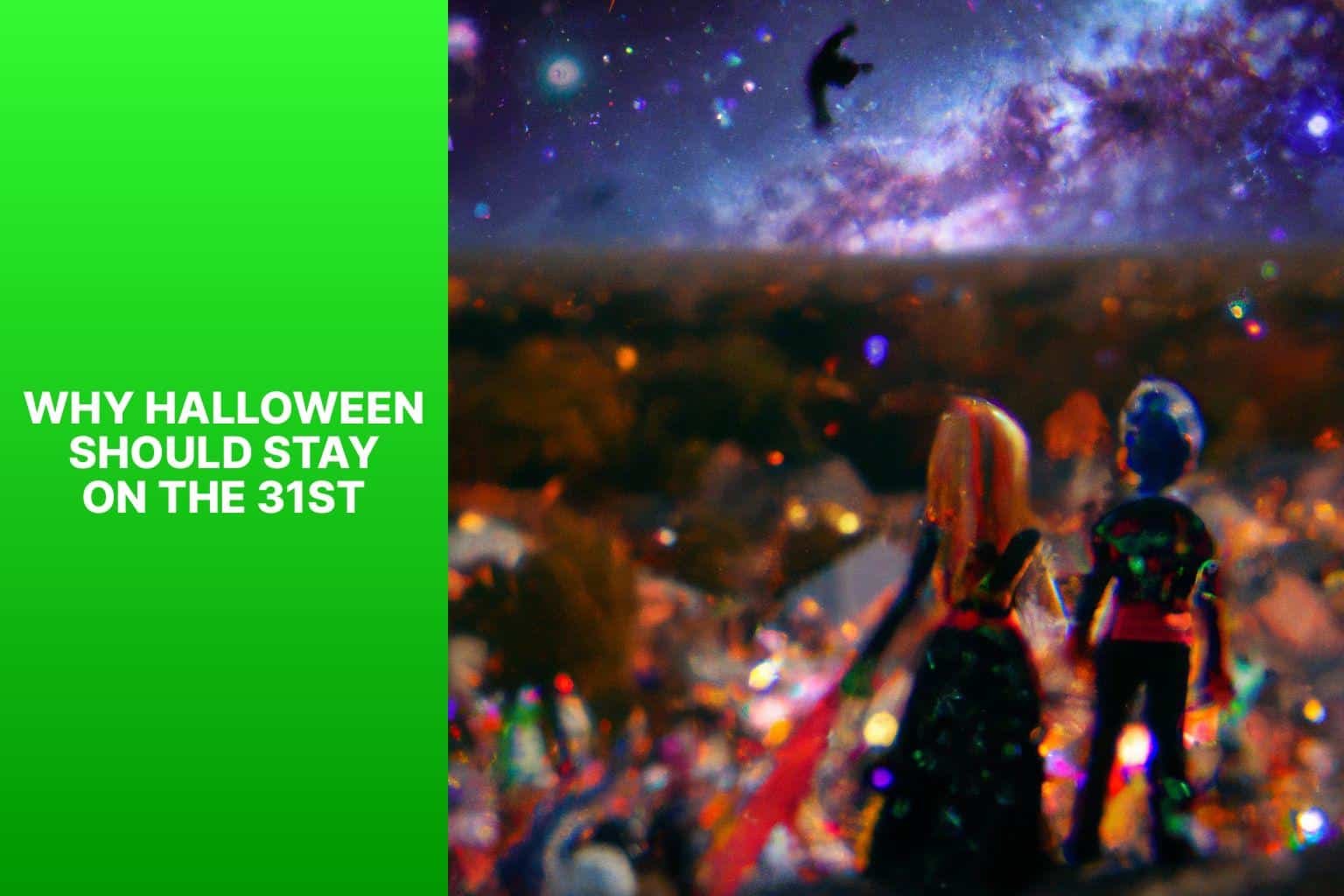Halloween, a beloved holiday celebrated on the 31st of October, holds a strong tradition that has been ingrained in our society for centuries. Understanding the reasons behind this historical and cultural significance sheds light on why Halloween should remain on the 31st. This tradition carries immense value and symbolic meaning for people all around the world.
1. Historical Significance: The origin of Halloween can be traced back to the ancient Celtic festival of Samhain, which marked the end of the harvest season and the beginning of winter. The connection between Halloween and Samhain is deeply rooted and changing the date would sever this historical link.
2. Cultural Importance: Halloween has become deeply ingrained in the cultural fabric of many societies. It is a cherished holiday that brings communities together, allowing them to celebrate folklore, supernatural elements, and the spirit of the season.
3. Symbolic Meaning: The date of October 31st holds symbolic significance associated with ideas of magic, mystery, and the boundaries between the living and the dead. It is a time when people embrace the supernatural, connect with their ancestors, and partake in traditions such as trick-or-treating and costume parties.
The reasons why Halloween should stay on the 31st are equally compelling. Maintaining this date ensures alignment with the ancient festival of Samhain, promotes the continuity of tradition, provides convenience and familiarity for individuals and communities, and fosters global recognition and unity.
As we explore the arguments against changing the date of Halloween, it becomes evident that doing so would lead to a historical and cultural disconnect, impact cherished traditions and superstitions, disrupt social events and plans, and even have economic considerations to take into account. Preserving the time-honored tradition of celebrating Halloween on the 31st is essential for maintaining the spirit and essence of this beloved holiday.
Key takeaway:
- Halloween on the 31st preserves historical significance: The tradition of celebrating Halloween on the 31st aligns with the ancient Celtic festival of Samhain, adding to its historical and cultural importance.
- Halloween on the 31st ensures continuity of tradition: Keeping Halloween on the 31st maintains the familiarity and continuity of a long-standing cultural celebration, allowing communities to pass down traditions from generation to generation.
- Halloween on the 31st promotes global recognition and unity: By observing Halloween on the same date globally, it creates a sense of unity and shared experience among people worldwide, fostering a global recognition of this festive occasion.
The Tradition of Celebrating Halloween on the 31st
Why should Halloween stay on the 31st? Let’s explore the rich tradition of celebrating Halloween on this iconic date. From its historical significance to its cultural importance and symbolic meaning, we’ll uncover the unique reasons why the 31st of October holds a special place in the hearts of Halloween enthusiasts worldwide. Get ready to dive into the fascinating tales and traditions that have shaped this beloved holiday!
1. Historical Significance
The celebration of Halloween on October 31st holds great historical significance.
This tradition can be traced back to the ancient Celtic festival of Samhain, an event that marked the end of the harvest season and the start of winter.
During Samhain, individuals would ignite bonfires and don costumes in order to ward off spirits.
The belief was that by disguising themselves, the spirits would not be able to recognize them.
Offerings of food and drink were also made to appease the spirits and ensure a fruitful harvest the following year.
As Christianity spread, the festival of Samhain merged with the Christian observance of All Hallows’ Eve, eventually becoming what we now know as Halloween.
The customs of dressing up and carving pumpkins have become integral parts of Halloween celebrations.
Celebrating Halloween on October 31st carries historical significance as it maintains a connection to the ancient Celtic beliefs and practices.
This is a time to pay homage to the ancestors, remember those who have passed, and rejoice in community and unity.
Preserving this historical tradition adds depth and meaning to modern-day Halloween festivities.
2. Cultural Importance
The cultural importance of Halloween is evident in various aspects, including its historical significance. Halloween has roots in ancient Celtic festivals like Samhain and has been celebrated for centuries. It is deeply ingrained in the cultural heritage of countries like Ireland, Scotland, and the United States.
Halloween plays a crucial role in community bonding. It brings communities together through activities like trick-or-treating, costume parties, and haunted houses. This holiday provides an opportunity for individuals to engage with their neighbors and strengthen social connections, showcasing its cultural importance.
Halloween showcases cultural expressions. It allows individuals to express their creativity and celebrate their favorite characters, themes, and ideas through costumes. This celebration encourages artistic expression and cultural exploration, highlighting its cultural significance.
Halloween contributes to the promotion of folklore. Its traditions involve storytelling, folklore, and mythical creatures. By engaging in these activities, Halloween helps preserve and pass along cultural narratives, legends, and superstitions to future generations, emphasizing its cultural importance.
Halloween’s cultural significance extends to the economy. This holiday has a significant economic impact, with increased sales and job opportunities for businesses like costume and decoration stores. This aspect further solidifies the cultural importance of Halloween in society.
3. Symbolic Meaning
The symbolic meaning of Halloween can be understood through various elements associated with this holiday.
Pumpkins are a significant symbol of Halloween. Carving pumpkins into jack-o’-lanterns wards off evil spirits and guides lost souls.
Wearing costumes on Halloween originated from ancient beliefs that disguising oneself protects against malevolent spirits. Costumes allow individuals to transform into different characters and embrace creativity.
Halloween is often connected with ghosts and spirits symbolizing the boundary between the living and the dead. It represents the belief in an afterlife and allows individuals to honor deceased loved ones.
The association of witches and magic with Halloween represents the mystical and supernatural aspects of the holiday. It symbolizes the time when the veil between the physical and spiritual worlds is thinnest.
Halloween’s roots in the ancient festival of Samhain also bring symbolic meaning related to the harvest. It represents the end of summer and the beginning of winter, reminding us of the cyclical nature of life and the importance of gratitude for the abundance of the harvest.
Trick-or-treating symbolizes the spirit of community and sharing. It represents the exchange of treats as a way to bring joy and camaraderie among neighbors and friends.
Together, these symbols and traditions contribute to the symbolic meaning of Halloween, embracing both the spooky and the festive aspects of the holiday.
Reasons Why Halloween Should Stay on the 31st
Embracing the spirited enchantment of Halloween, let’s explore the compelling reasons why it should always remain on the 31st. From its deep-rooted alignment with Samhain to the continuity of cherished traditions, the convenience and familiarity it brings, and the global recognition it holds, this iconic date unites us in a collective celebration unlike any other. So, get ready to dive into the captivating arguments that support keeping Halloween firmly rooted on the 31st.
1. Alignment with Samhain
The alignment between Halloween and Samhain is crucial for comprehending the holiday’s roots and traditions. Samhain, an ancient Celtic festival, marked the end of the harvest season and the start of winter. It was believed to be a time when the physical world and spiritual realm were closely connected, allowing spirits and souls to freely roam.
During Samhain, the Celts would light bonfires and wear costumes to safeguard themselves from evil spirits. This tradition subsequently became part of Halloween celebrations. Halloween is celebrated on the 31st, which aligns with Samhain as the eve of this age-old festival.
Aligning Halloween with Samhain maintains the historical and cultural importance of the holiday. It ensures that the traditions and rituals associated with Samhain are preserved and handed down through generations. It allows people to connect with their ancestors and honor the ancient traditions of their heritage.
Preserving the alignment of Halloween with Samhain also provides a sense of continuity and familiarity. It allows people to participate in a global celebration recognized and celebrated by millions worldwide. Changing the date of Halloween would disrupt these traditions and disconnect Halloween from its historical and cultural roots.
Understanding the alignment of Halloween with Samhain can enhance appreciation for the rich history and traditions of this festive holiday. Embrace the ancient traditions and celebrate Halloween on the 31st to honor the connection with Samhain.
2. Continuity of Tradition
- Halloween, a tradition celebrated on the 31st for centuries, has been a consistent and familiar event.
- Promoting the continuity of this tradition ensures that future generations can partake in the same customs.
- By honoring the historical significance of Halloween and maintaining its celebration on the 31st, we preserve its essence.
- Changing the date of Halloween would disrupt the longstanding tradition, creating confusion and impacting numerous cultures.
- Moreover, keeping Halloween on the 31st promotes unity among celebrating communities.
- If the date were to change, adjustments to various events and plans organized around Halloween on the 31st would be necessary.
- Considering the economic impact, preserving Halloween on the 31st is essential for many businesses that rely on this holiday for revenue.
3. Convenience and Familiarity
Celebrate Halloween on the 31st for both convenience and familiarity. This date has been observed for many years, so people are well acquainted with planning activities around it. Having a consistent date allows for better coordination of events and parties, providing convenience for all involved. Families and parents also benefit from this convenience, as they can easily plan their schedules around Halloween activities.
The 31st has become deeply ingrained in popular culture and traditions, creating a sense of excitement and anticipation each year. Changing the date would disrupt this established familiarity and potentially cause confusion and inconvenience.
4. Global Recognition and Unity
Halloween celebrated on October 31st has gained global recognition and promotes unity among different cultures.
The global recognition and unity of Halloween on October 31st is crucial to maintaining the spirit of this holiday.
It allows people from all walks of life to come together and celebrate, fostering a sense of belonging and commonality.
By continuing to observe Halloween on October 31st, we ensure that this tradition remains a unifying force for communities worldwide.
Let’s embrace the global recognition and unity that Halloween on the 31st brings and continue to celebrate this cherished holiday on its traditional date.
Arguments Against Changing the Date of Halloween
When it comes to changing the date of Halloween, there are strong arguments against it. Let’s dive into various aspects that shed light on why keeping Halloween on the 31st is crucial. From its historical and cultural significance to the impact on traditions, superstitions, social events, and even economic considerations, each sub-section of this discussion presents compelling reasons to maintain the status quo. Prepare to delve into the fascinating reasons why altering this iconic date may not be the best idea.
1. Historical and Cultural Disconnection
Historical and cultural disconnection from the original meaning of Halloween is a major concern. Over time, Halloween has transformed from its ancient Celtic and Christian roots. Nevertheless, it has become increasingly commercialized and distanced from its origins.
In present times, Halloween is commonly associated with costumes, parties, and trick-or-treating, often overshadowing its historical and cultural significance. Many individuals are unaware of the deep-rooted traditions and beliefs connected to Halloween, including its ties to the ancient festival of Samhain.
Preserving Halloween on the 31st ensures a connection to its historical and cultural roots. This guarantees that future generations comprehend and value the origins of this holiday. It enables us to pay tribute to and respect the customs of our ancestors while relishing in the festivities and enjoyment.
Changing the date of Halloween would further sever our connection to its historical and cultural context. It would diminish the meaning and importance of the holiday, reducing it to a mere date on the calendar.
By maintaining Halloween on the 31st, we can continue to celebrate and pass down the traditions and folklore associated with this exceptional day. It empowers us to uphold a sense of cultural identity and safeguard the distinctive heritage that Halloween represents.
2. Impact on Tradition and Superstitions
The impact on tradition and superstitions related to Halloween staying on the 31st is significant.
By keeping Halloween on the 31st, we preserve long-standing traditions and rituals associated with the holiday.
These customs hold cultural and historical importance, and changing the date could disrupt their significance and meaning.
Many people associate specific superstitions with Halloween, such as avoiding black cats or believing in spirits and ghosts.
These superstitions are deeply ingrained in the celebration of Halloween on October 31st.
Changing the date could potentially undermine these beliefs and alter the overall experience for those who adhere to them.
Halloween’s roots can be traced back to the ancient Celtic festival of Samhain, and celebrating it on the 31st aligns with the historical and cultural origins of the holiday, reinforcing its traditional significance.
By celebrating Halloween globally on the 31st, we create a shared experience and foster a sense of unity.
Changing the date could lead to confusion and a loss of cultural identity associated with Halloween.
Therefore, preserving Halloween on the 31st maintains the impact of tradition and superstitions, ensuring the holiday’s enduring significance and cultural relevance.
3. Disruption to Social Events and Plans
Disruption to Social Events and Plans:
1. The rescheduling or cancellation of events would cause scheduling conflicts when Halloween is moved from the 31st. People specifically plan parties, events, and gatherings for that day, and changing the date would require adjustments to these plans.
2. Moving the date of Halloween would disrupt traditions and potentially lead to confusion and disappointment for children and families who often participate in organized community events and trick-or-treating on the evening of the 31st.
3. Many individuals, particularly those who work during the week, plan their Halloween celebrations and costume parties on the weekend closest to the 31st. Shifting the date would interfere with these plans and may result in a decrease in attendance.
4. Changing the date of Halloween would have an impact on local businesses and entertainment venues, such as haunted houses, that rely on the Halloween season for a significant portion of their yearly revenue. This could potentially lead to financial losses for these establishments.
5. The 31st of October is widely recognized and holds cultural significance as the day for Halloween celebrations. Altering the date would undermine the shared experience and sense of community associated with this holiday.
4. Economic Considerations
When considering the economic implications of changing the date of Halloween, several factors come into play. These economic considerations can have significant impacts on businesses, industries, and consumer spending.
1. Retail Sales: Halloween generates substantial revenue for retailers through the sale of costumes, decorations, and candy. Changing the date could disrupt sales patterns and potentially decrease revenue.
2. Seasonal Employment: Halloween provides temporary job opportunities in areas such as retail, manufacturing, and entertainment. Altering the date may affect the availability of seasonal jobs and impact employment rates.
3. Supply Chain: The Halloween industry relies on a complex supply chain involving production, distribution, and sale of various products. Changing the date could disrupt this chain and create logistical challenges.
4. Tourism and Attractions: Halloween-themed events and attractions attract tourists, contributing to local economies. Shifting the date may result in decreased revenue for these businesses.
Frequently Asked Questions
Why should Halloween stay on October 31st?
Halloween should stay on October 31st for several reasons. It is a long-standing tradition that dates back to the 1850s. Moving Halloween to a different date would disrupt the age-old tradition and cultural significance of this holiday. It is the original date of celebration and changing it would diminish the excitement and anticipation associated with Halloween.
Will moving Halloween to a Saturday make it safer?
While proponents argue that moving Halloween to a Saturday would make it safer for children, safety concerns can be addressed regardless of the day. Parents can ensure their children’s safety by accompanying them while trick-or-treating, using reflective tape or glow sticks, and encouraging the use of costumes with reflective material. Ultimately, the key to a safe Halloween lies in responsible adult supervision and adherence to safety guidelines.
Why is the change.org petition addressing President Trump ridiculous?
The change.org petition calling for Halloween to be celebrated on the last Saturday of October and addressing President Trump is considered ridiculous because Halloween is not a federal holiday. It is a day of celebration and fun, and not a matter of national importance or under the jurisdiction of the White House.
What impact would moving Halloween to a Saturday have on school celebrations?
Moving Halloween to a Saturday would disrupt the tradition of children wearing costumes to school. It would also result in shifting school parties and potentially interfere with normal learning routines. Celebrating Halloween on a weekday allows children to break the monotony of the week and enjoy the festivities without conflicting with regular schoolwork.
Will changing Halloween to a Saturday alleviate the burden on parents?
While changing Halloween to a Saturday might seem like it would alleviate the burden on parents, it may actually create more chaos and work. If National Trick or Treat Day is established on a Saturday, children may want to go trick-or-treating twice, which would burden parents with additional responsibilities. Families often have pre-existing commitments on Saturdays, such as sports games or college football, which might make celebrating Halloween more challenging.
What are the financial implications of moving Halloween to a different date?
Halloween is a significant economic event, with millions of Americans spending billions of dollars on candy, decorations, costumes, and pumpkins. Moving Halloween to a different date, such as the last Saturday of October, could have negative financial implications for retailers and businesses that rely on Halloween-related sales. It could disrupt spending patterns, affect profit margins, and require adjusting marketing strategies to accommodate the change.










